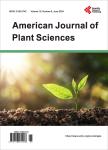Relevance of Advanced Plant Disease Detection Techniques in Disease and Pest Management for Ensuring Food Security and Their Implication: A Review
Relevance of Advanced Plant Disease Detection Techniques in Disease and Pest Management for Ensuring Food Security and Their Implication: A Review作者机构:Department of Plant Pathology North Dakota State University Fargo ND USA Department of Genomics Phenomics and Bioinformatics North Dakota State University Fargo ND USA USDA-ARS Cereal Crops Research Unit Edward T. Schafer Agricultural Research Center Fargo ND USA Department of Agriculture Agribusiness and Environmental Sciences Texas A&M University Kingsville TX USA Department of Botany and Plant Pathology Purdue University West Lafayette IN USA Department of Plant Pathology Indian Agricultural Research Institute New Delhi India
出 版 物:《American Journal of Plant Sciences》 (美国植物学期刊(英文))
年 卷 期:2023年第14卷第11期
页 面:1260-1295页
学科分类:1002[医学-临床医学] 100214[医学-肿瘤学] 10[医学]
主 题:Disease Management Detection Techniques Advanced Detection Sustainability Science-Policy Food Security
摘 要:Plant diseases and pests present significant challenges to global food security, leading to substantial losses in agricultural productivity and threatening environmental sustainability. As the world’s population grows, ensuring food availability becomes increasingly urgent. This review explores the significance of advanced plant disease detection techniques in disease and pest management for enhancing food security. Traditional plant disease detection methods often rely on visual inspection and are time-consuming and subjective. This leads to delayed interventions and ineffective control measures. However, recent advancements in remote sensing, imaging technologies, and molecular diagnostics offer powerful tools for early and precise disease detection. Big data analytics and machine learning play pivotal roles in analyzing vast and complex datasets, thus accurately identifying plant diseases and predicting disease occurrence and severity. We explore how prompt interventions employing advanced techniques enable more efficient disease control and concurrently minimize the environmental impact of conventional disease and pest management practices. Furthermore, we analyze and make future recommendations to improve the precision and sensitivity of current advanced detection techniques. We propose incorporating eco-evolutionary theories into research to enhance the understanding of pathogen spread in future climates and mitigate the risk of disease outbreaks. We highlight the need for a science-policy interface that works closely with scientists, policymakers, and relevant intergovernmental organizations to ensure coordination and collaboration among them, ultimately developing effective disease monitoring and management strategies needed for securing sustainable food production and environmental well-being.



